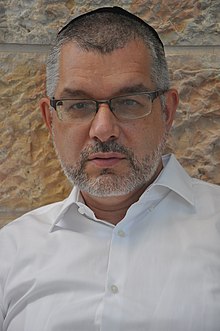Loading AI tools
American Jewish historian From Wikipedia, the free encyclopedia
Yohanan Petrovsky-Shtern[lower-alpha 1] (born Ivan Myronovych Petrovsky,[lower-alpha 2] April 6, 1962) is an American historian, philologist and essayist, noted in particular for his studies of the institution of Cantonism, his critique of Aleksandr Solzhenitsyn's controversial two volume-work about Jews in Russia, Two Hundred Years Together, as well as translations of Jorge Luis Borges' works into Russian.[1] He is the Crown Family Professor of Jewish Studies and a Professor of Jewish History in History Department at Northwestern University where he teaches Early Modern, Modern and East European Jewish history.
This article has multiple issues. Please help improve it or discuss these issues on the talk page. (Learn how and when to remove these messages)
|
Yohanan Petrovsky-Shtern | |
|---|---|
Йоханан Петровський-Штерн | |
 | |
| Born | Ivan Myronovych Petrovsky April 6, 1962 |
| Nationality | American |
| Other names | Ivan Petrovsky |
| Occupation(s) | Historian, Philologist, Academic |
| Academic background | |
| Alma mater | |
| Doctoral advisor |
|
| Academic work | |
| Discipline | Jewish History and Religion |
| Institutions | |
Petrovsky-Shtern was born in Kyiv in 1962 to the family of Miron Petrovsky (Петровський Мирон Семенович), a Ukrainian philologist. His birth name was Ivan Petrovsky, as attested by his published translations of Jorge Luis Borges.[2]
He holds a Doctor of Philosophy (PhD) in Comparative Literature from Moscow University and a second Doctor of Philosophy (PhD) in Jewish History from Brandeis University. He has been a Rothschild Fellow at Hebrew University in Jerusalem, a Sensibar Visiting Professor at Spertus Institute for Jewish Learning and Leadership in Chicago, a Visiting Scholar at École des Hautes Études en Sciences Sociales, a research fellow at The National Endowment for the Humanities, in Poland, and a Fulbright Scholar at Kyiv Mohyla Academy in Kyiv.[3]
Petrovsky-Shtern had several solo exhibitions, including such venues as the French Institute in July 2019 in Kyiv, Ukraine;[4] the Ukrainian Institute of America in spring 2015 in New York City;[5] Ukrainian Institute of Modern Art in February–March 2014 in Chicago;[6] and in November 2012 at the museum of the Spertus Institute for Jewish Learning and Leadership in Chicago.[7]
Petrovsky-Shtern analyses the folkways and fantasies of his Jewish and Ukrainian heritage through “revisiting foundational narratives from the Hebrew Bible, Eastern European Jewish folk-characters and folk-tales, images and artifacts from his native Ukraine, and—of course—the Holocaust,” wrote Jerome Chanes in Jewish Week.[8]
“Although Petrovsky-Shtern’s main fields of interest are history and literature, ranging from the Jewish Middle Ages to Hasidic folklore, from the prose of Gabriel Garcia Marquez to the Ukrainian renaissance of the 1920s, it is on canvas that the depth of his knowledge of various religions and cultures is transformed into a mysterious world of tales and myths,” wrote the poet Vasyl Makhno.[9]
Among his publications are many scholarly articles and such monographs as:
Seamless Wikipedia browsing. On steroids.
Every time you click a link to Wikipedia, Wiktionary or Wikiquote in your browser's search results, it will show the modern Wikiwand interface.
Wikiwand extension is a five stars, simple, with minimum permission required to keep your browsing private, safe and transparent.